Motherless Infant Gorilla in Ugenda Group Freed from Snare
By Gorilla Doctors Staff on Monday, December 30th, 2013 in Blog.Mountain gorilla infant Sabato has had a rough start to his young life. First, he endured a series of violent interactions between dominant silverback Ugenda, beta silverback Wageni and lone silverback Gushimira in February 2013 during which the silverbacks and other members of the group sustained injuries which required veterinary attention from Gorilla Doctors. During these interactions, his mother, 17-year-old Kurudi, left the group and joined Gushimira, leaving Sabato alone in Ugenda group at the tender young age of 2. Infant gorillas continue to nurse and rely on their mother for survival during the first 4 years of their lives. It was surely traumatic for Sabato to be left alone at such a young age. However, because Kurudi did not take her infant with her, Sabato escaped potential infanticide by the new silverback leader. With the companionship of his 7-year-old brother Iterambere and protection from dominant silverback Ugenda, little Sabato has managed to survive without his mother.
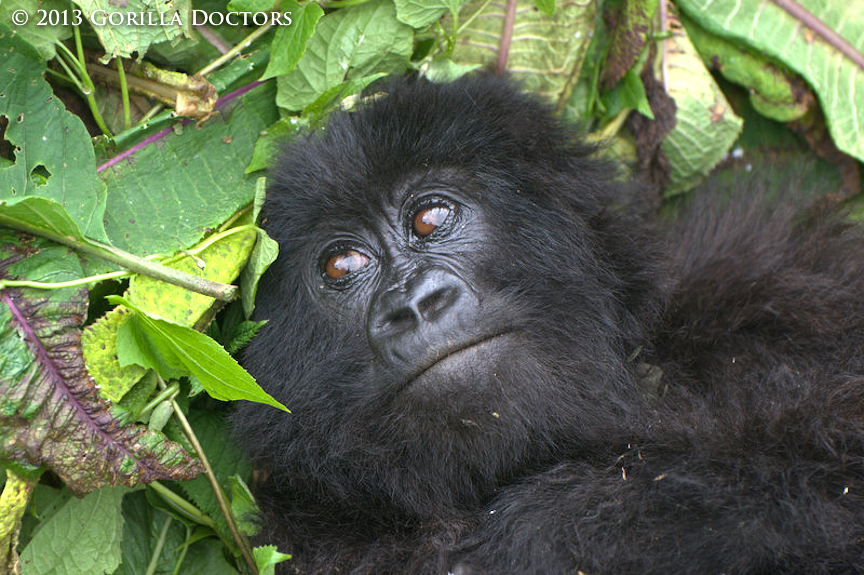 3-year-old infant mountain gorilla Sabato, of Ugenda group.
3-year-old infant mountain gorilla Sabato, of Ugenda group.
Last week, Sabato endured yet another traumatic experience: he was caught in a rope snare. On December 26th, the Gorilla Doctors Head Rwanda Field Vet Dr. Jean Felix Kinani, along with Volcanoes National Park Veterinary Warden Elisabeth Nyirakaragire and trackers from the Fossey Fund’s Karisoke Research Center, intervened to free the infant from the snare. Here is Dr. Jean Felix’s report:
“When Elisabeth and I arrived to the group, Sabato was bright, alert, and responsive, feeding and moving with a 1 meter long rope snare hanging from his right hand.
Since his mother Kurudi transferred out of the group (to Gushimira group, then to Titus group) when Sabato was just 2 years old, the infant has been moving and sleeping with silverback Ugenda. When I darted him, Sabato was behind Ugenda and he removed the syringe, dropping it in front of the silverback. Ugenda picked it up, smelled it and immediately became suspicious.
Four minutes later, when Sabato was fully under anesthesia, Ugenda displayed and we had to call on the trackers to keep him back. Ugenda backed away initially but tried to return to where we were working on Sabato. The trackers, armed with long sticks of bamboo, managed to deter him and the silverback went to sit in the vegetation, observing our movements from about 40 meters away.
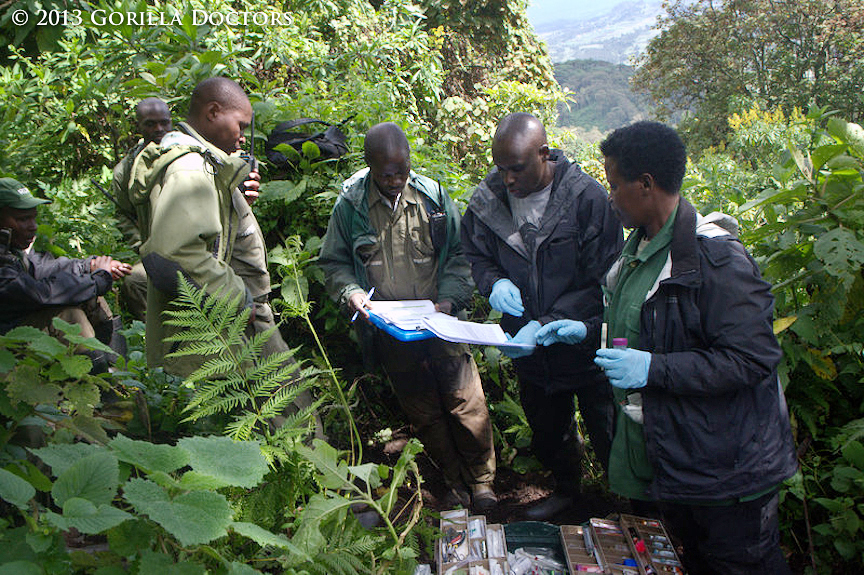 The team preparing to intervene and release Sabato from a rope snare.
The team preparing to intervene and release Sabato from a rope snare.
We first cut the rope snare from Sabato’s right hand and examined the infant, looking for wounds. He had several small, superficial wounds on his left wrist and on the right hand. I cleaned each wound and administered antibiotics and painkillers to help with healing.
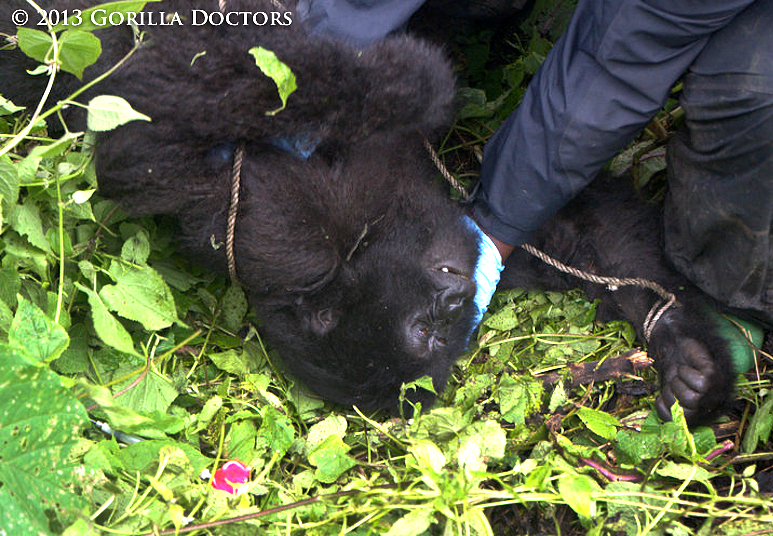 Sabato is anesthetized to allow the Gorilla Doctors to remove the snare and treat his wounds.
Sabato is anesthetized to allow the Gorilla Doctors to remove the snare and treat his wounds.
We collected blood samples and swabs for future research and testing while Sabato was under anesthesia. Based on the physical exam, Sabato appeared to be in good health.
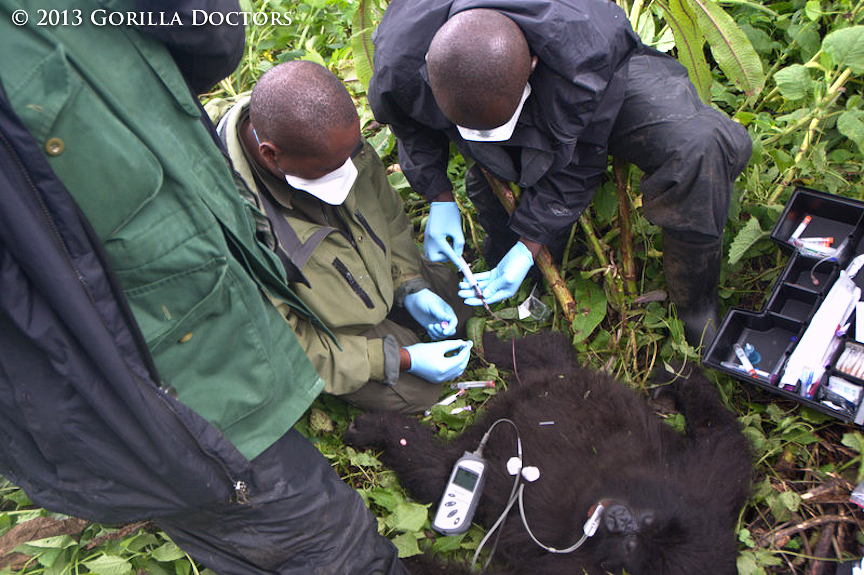 Dr. Jean Felix collects blood samples during the snare intervention for Sabato.
Dr. Jean Felix collects blood samples during the snare intervention for Sabato.
After 22 minutes under, I administered Atipamezole to reverse the anesthesia at the completion of the intervention.
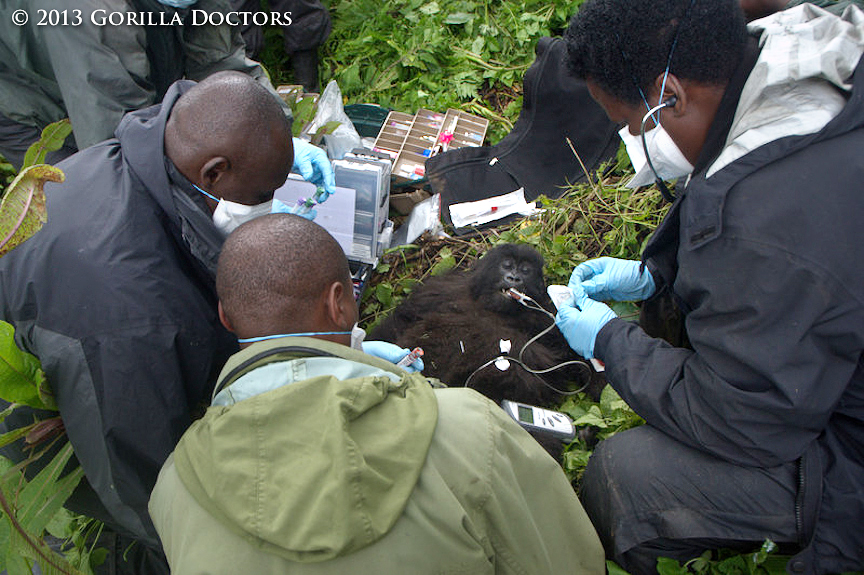 Samples are collected, medications administered and Sabato’s wounds were treated during the intervention.
Samples are collected, medications administered and Sabato’s wounds were treated during the intervention.
After waking from the anesthesia, Sabato fell back asleep for about 15 minutes, and then woke up and looked at us. Silverback Ugenda approached us but kept his distance and barked, screaming twice. He was joined by beta silverback Wageni and they watched us for a while. Elisabeth and I moved with all the trackers up a hill, ~40 meters away and all of the gorillas joined both silverbacks.
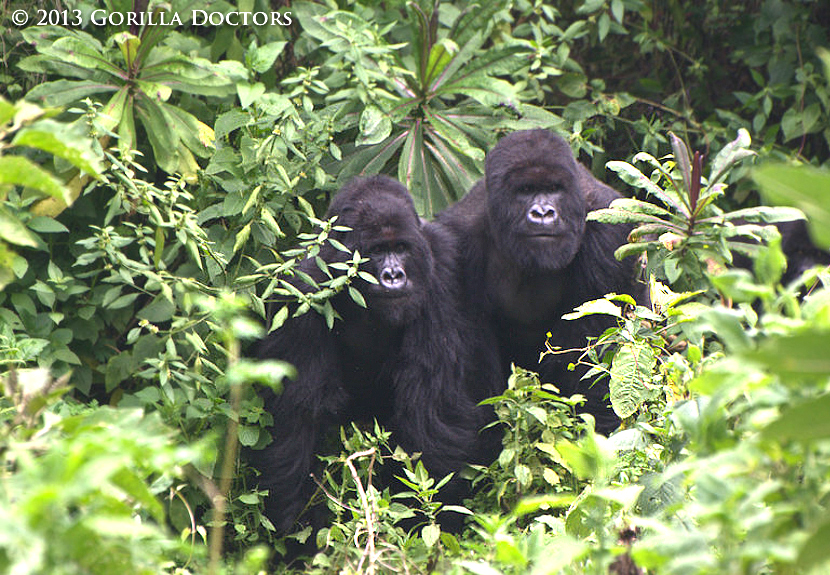 Silverbacks Ugenda and Wageni watch the field team, wary after the intervention.
Silverbacks Ugenda and Wageni watch the field team, wary after the intervention.
The Fossey Fund Karisoke trackers will continue to monitor Sabato and report progress and/or changes to Gorilla Doctors. Thanks to the excellent collaboration of all partners (Gorilla Doctors, Dian Fossey Gorilla Fund International, and the Rwanda Development Board), another mountain gorilla was successfully freed from a poacher’s snare. This marks the seventh snare intervention to be conducted by Gorilla Doctors in Rwanda, Uganda, and DRC in 2013.
You can follow the Gorilla Doctors health monitoring efforts on our Facebook page, where we post photos and notes from our monthly visits.
Please consider supporting us by making a secure online donation. Every dollar you give goes to directly supporting our gorilla health programs and One Health initiative. Thank you for your generosity.


 Donate
Donate